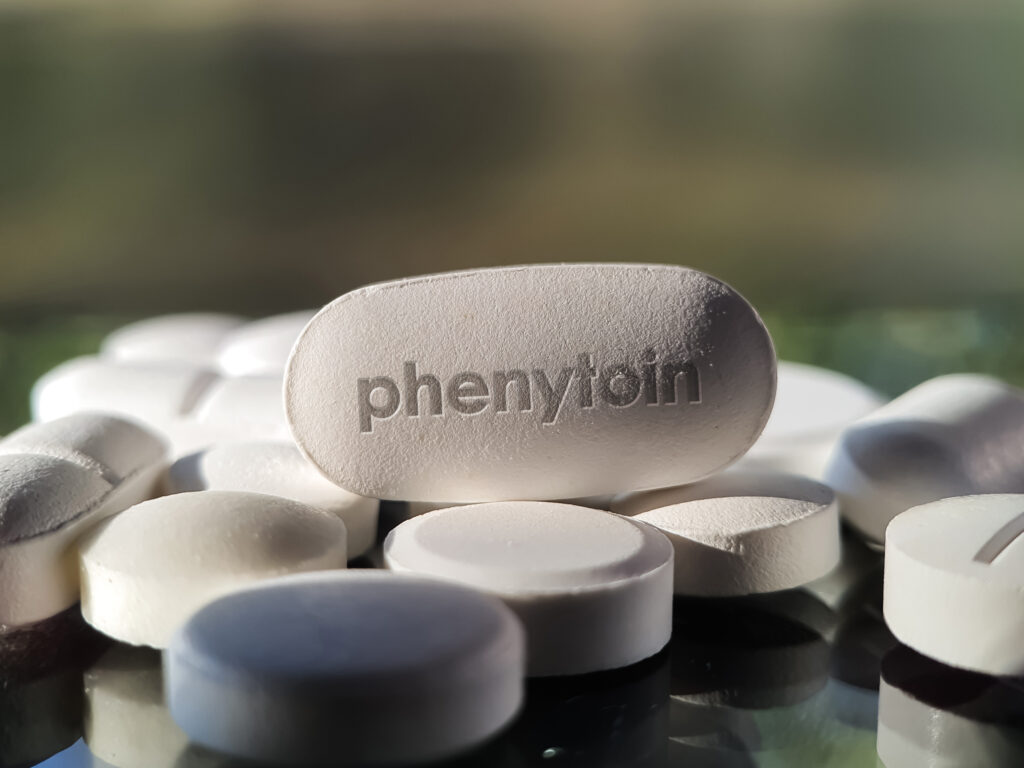What is Dilantin?
Dilantin (phenytoin) is an anticonvulsant or antiepileptic drug used to control and prevent seizures by decreasing abnormal activity in the brain that can cause seizures. In some cases, it can be used to treat an irregular heartbeat or some mental health conditions as well. It is typically prescribed in long-acting capsules, chewable tablets, or liquid to be taken by mouth. When being used to treat a seizure longer than five minutes, it can be given intravenously. Dilantin can be taken one to four times a day and should be taken at the same time each day. If you receive nutritional support from a feeding tube, talk to your doctor before beginning Dilantin as this can affect how your body digests the medication. Dilantin should not be combined with alcohol because it can cause damage to the liver and can affect the levels of the drug in your blood. People taking Dilantin should not drive or operate heavy machinery until they know how the medication affects them.
Before starting Dilantin, speak to your doctor if you have any of the following health conditions:
- Depression or mood disorders
- Are allergic to any ingredients in Dilantin
- Have kidney or liver problems
- Hyperglycemia
- Consume alcohol
- Are pregnant or plan to become pregnant
Dilantin Effects
Effects of Dilantin can include:
- Difficulty sleeping
- Dizziness
- Pain in penis or prolonged erections
- Involuntary eye movements
- Excessive growth of gums
- Involuntary body movements
- Swollen lips
- Confusion
- Headache
- Slurred Speech
- Incoordination
- Hair growth
- Constipation
- Swollen glands
- Nausea or vomiting
- Yellowing of eyes or skin, or other signs of liver damage
- Blisters, excessive bleeding
- Shortness of breath
- Cough, sore throat, mouth ulcers
- Decreased appetite
Serious side effects may include:
- Suicidal thoughts
- Liver damage
- Hypotension
- Weakened bones
- Neuropathy
- Can cause birth defects in unborn babies
Signs of Dilantin Addiction and Abuse

While Dilantin is not a commonly abused drug, there are certainly instances where it is abused. Because it does not provide a euphoric feeling like opioids or other commonly abused medication, it is not usually people’s drug of choice. Most often, abuse of Dilantin is done by combining the drug and other substances, usually alcohol. Consuming alcohol with Dilantin decreases the effectiveness of the medication as well as poses a major risk of damaging the liver and other vital organs. Alcohol is a depressant, so combining that with a drug that can cause suicidal thoughts is not advised and should be avoided.
Dilantin Withdrawal Symptoms
Dilantin should not be stopped without first speaking to your healthcare provider. They will develop a plan to slowly decrease the use to prevent serious health issues. Discontinuing this medication all at once can cause an increase in seizure activity or a seizure that doesn’t stop. Additionally, suicidal thoughts or actions can increase if it is not slowly decreased. Call your doctor right away if you develop suicidal thoughts or attempts, new or worsening depression or anxiety, insomnia, increased impulsivity, or any other changes in mood or behaviors. If you experience difficulty breathing or swelling of the face, mouth, or tongue, you should contact your doctor immediately.
Long Term Side Effects of Dilantin Abuse
Serious long term side effects of Dilantin can include:
- Liver damage
- Delirium or psychosis caused by elevated levels of the medication in your blood. This is often a result of mixing the medication with alcohol.
- Low blood count which can increase the risk of infection.
- Softening of bones which can cause osteoporosis, osteopenia, or osteomalacia. Weakened bones also contribute to an increase in bone fractures.
- High blood sugar
- Difficulty with movement and balance
Dilantin Addiction Treatment
Dilantin addiction is treated through a combination of emotional and behavioral therapies to help identify and target the root causes of the addiction. Therapies may include Cognitive Behavioral Therapy, EMDR, Hypnosis, Art or Music Therapy, etc. Treatment can take place in an outpatient clinic or at an inpatient facility depending on the level of addiction. In some cases, medication assisted treatment may be utilized to increase client’s success in recovery. If you or a loved one is struggling with Dilantin addiction, Novo Detox addiction specialists are available to take your call.




